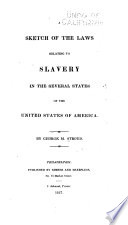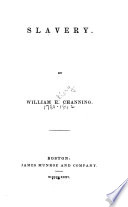 | Louisiana - Civics - 1825 - 804 pages
...contracting marriage, and of forming other engagements. ART. 35. — A slave is one who is in the power of a master to whom he belongs. The master may sell him, dispose of his person, his industry and his labor : he can do nothing, possess nothing, nor acquire any thing but what must belong to his... | |
 | George McDowell Stroud - Slavery - 1827 - 190 pages
...slave under the civil law. According to the law of Louisiana, " A slave is one who is in the power of a master to whom he belongs. The master may sell him, dispose of his person, his industry and his labour: he can do nothing, possess nothing, nor acquire any thing but what must belong to his... | |
 | George Bourne - Slavery - 1833 - 228 pages
...INTENTS, CONSTRUCTIONS, AND PURPOSES WHATSOEVER." In Louisiana, " A slave is one who is in the power of a master, to whom he belongs ; the master may sell him, dispose of his person, his industry and his labor ; he can do nothing, possess nothing, nor acquire anything but what belongs to his master.... | |
 | William Ellery Channing - Slavery - 1835 - 184 pages
...or to use his power for his own good. " A slave," says the Louisiana Code, " is in the power of the master to whom he belongs. The master may sell him,...acquire any thing, but which must belong to his master." " Slaves shall be deemed, taken, reputed, and adjudged," say the South Carolina laws, " to be chattels... | |
 | William Jay - Antislavery movements - 1835 - 230 pages
...slavery are, it will be perceived, from high authority:— " A slave is one who is in the power of a master to whom he belongs. The master may sell him, dispose of his person, his industry, his labour; he can do nothing, possess nothing, nor acquire any thing but which must belong to his master."... | |
 | Books - 1835 - 642 pages
...slavery are, it will be perceived, from high authority :— " ' A slave is one who is in the power of a master to whom he belongs. The master may sell him, dispose of his person, his industry, his labour; he can do nothing, possess nothing, nor acquire any thing but which must belong to his master.'... | |
 | Theology - 1837 - 588 pages
...principles of God's word. A slave is defined, in the Louisiana code, to be "one who is in the power of a master to whom he belongs. The master may sell him, dispose of his person, his industry, his labour; he can do nothing, posess nothing, nor acquire any thing but which must belong to his master."... | |
 | Antislavery movements - 1835 - 184 pages
...power of a master to whom he belongs. The master may sell him, dispose of his person, his industry and his labor: he can do nothing, possess nothing, nor acquire any thing, but what must belong to his master. The law of South Carolina adjudges slaves " to be chattels personal... | |
 | Slavery - 1838 - 148 pages
...meaning of the term slavery. "A slave," fays the law of Louisiana, " is one who is in the power of the master to whom he belongs. The master may sell him, dispose of his person, his industry, and his labor : he can do nothing, possess nothing, nor acquire my thing, but what must belong to his... | |
 | La Roy Sunderland - Antislavery movements - 1836 - 194 pages
...purposes whatsoever." The law of Louisiana declares: — " A slave is one who is in the power of the master to whom he belongs. The master may sell him, dispose of his person, his industry and labor ; he can do nothing, possess nothing, nor acquire anything, but what must belong to his master."... | |
| |